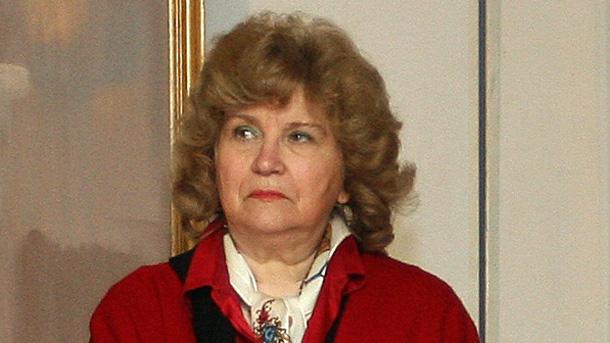Few people know that with Apostolic Letter Egregiae Virtutis of 31 December 1980, Pope John Paul II declared Saints Cyril and Methodius co-patron saints of Europe. According to the Pope, the Apostles to the Slavs are a bridge between East and West, who contributed significantly to the cultural growth of the continent and the education of generations of Europeans. The merit of the saints in both past and present has theological, ecclesiastical and purely cultural confirmation in the history of Europe, the message of the pope reads.
"March ahead, O! people revived,
To your future march ahead,
Forge your destiny of glory,
By the might of letters led.
...
You saints Cyril and Methodius,
You be blessed thrice above!
Fathers of Bulgarian learning,
Makers of the tongue we love!"
Every child in Bulgaria knows by heart these verses of the Hymn of St. Cyril and St. Methodius.
 Every Bulgarian keeps the Saints, creators of the Bulgarian alphabet and forefathers of Bulgarian literature, in his or her heart. It was in the mid-9th century when they created a new alphabet in Europe. "These letters are sacred to us," says Professor Boryana Hristova, Director of the Sts. Cyril and Methodius National Library in Sofia.
Every Bulgarian keeps the Saints, creators of the Bulgarian alphabet and forefathers of Bulgarian literature, in his or her heart. It was in the mid-9th century when they created a new alphabet in Europe. "These letters are sacred to us," says Professor Boryana Hristova, Director of the Sts. Cyril and Methodius National Library in Sofia.
"I think it is an honour for Europe to have such patrons," professor Hristova says. "These are people who believed in the power of speech, who believed in the power and victory of the logos. There are no better patrons for us than these people who created a new civilization in Europe and laid the foundations of a durable culture that we see flourishing to this very day."
Along with the Latin and Greek alphabets, the Cyrillic alphabet today is the third official alphabet of united Europe. "In a sense, the Salonika brothers Cyril and Methodius had this idea of a united Europe," - says Professor Aksinia Dzhurova, head of the Center for Slavic and Byzantine Studies "Professor Ivan Duichev" at the Sofia University in the period 1986-2010.
 "Essentially the work of Cyril and Methodius took place before the schism of 1054. This was a period in which there was still some hope that Europe would not be divided into East and West. There was also something else that was to determine the fate of Europe, and it was the linguistic situation on the continent. Latin and Greek were the main languages in Christian service and liturgies and in the ninth century Saints Cyril and Methodius changed the language map of Europe. The heroism of Cyril and Methodius is that they manage to convince the Pope to accept this new language," professor Dzhurova says.
"Essentially the work of Cyril and Methodius took place before the schism of 1054. This was a period in which there was still some hope that Europe would not be divided into East and West. There was also something else that was to determine the fate of Europe, and it was the linguistic situation on the continent. Latin and Greek were the main languages in Christian service and liturgies and in the ninth century Saints Cyril and Methodius changed the language map of Europe. The heroism of Cyril and Methodius is that they manage to convince the Pope to accept this new language," professor Dzhurova says.
In 867, in the Basilica of Santa Maria Maggiore in Rome, Pope Adrian II solemnly blessed the Bulgarian alphabet created by Cyril and Methodius, as well as books written in the new alphabet. Historians say the Pope rejected the "trilingual heresy" after discussions with of St. Cyril. Moreover, Adrian II ordered for solemn services in Bulgarian to be held in Roman basilicas. According to linguist Boryana Hristova, the creation of the Bulgarian alphabet was only the beginning of a great work.
"They created the system of language that can be used to express even the most complicated philosophical ideas. This is an unsurpassed philological feat. The ability to express every nuance of complex philosophical and ethical writings, as well as religious works in the most poetic way is really a huge feat.”
Bulgarian-Slavonic was a language not used only in Bulgaria, but it was actually the official language of other Orthodox Slavic nations like Russians and Serbs. It was also officially used by Orthodox Romanians, despite the fact they do not have Slavic origin. Professor Aksinia Dzhurova says she sees a link between the work of Saints Cyril and Methodius and the most recent European history.
"This is the third official language, and their work changed the linguistic map of Europe - something that happened in the 21st century when Bulgaria once again brought Cyrillic to Europe the way it did in the 9th century. Let us not forget – some 200 million in Europe use this alphabet."
In his Letter Egregiae Virtutis Pope John Paul II wrote that after many centuries of schism between East and West, between Rome and Constantinople decisive steps had been taken aimed at restoring the fullness of communion. “Declaring Saints Cyril and Methodius co-patrons of Europe together with St. Benedict, fully corresponds to the signs of our time..."
English: Alexander Markov
There are three special days on the calendar of the Bulgarian Orthodox church, on which believers pray to God and give alms to honour the memory of their dear departed. The three All Souls’ Days always fall on the Saturdays before Meat..
One frosty November morning in 1917, as World War I was raging, a Zeppelin L 59 took off from the air base near Yambol bound for Tanzania. The purpose of the flight was to deliver ammunition and materials to the German military units in a remote..
October 27 marks the 165th anniversary of the birth of Academician Aleksandar Teodorov-Balan, who was the first theorist of the Bulgarian literary language, phonetics and grammar. He was born was born in 1859 in the village of Kubey, Bessarabia...
The head of the statue of Tyche, the goddess of Philippopolis, has been discovered in the Episcopal Basilica in Plovdiv, said the head of the..
On November 30, the Bulgarian Orthodox Church honors the memory of St. Apostle Andrew . In Bulgaria the saint is known as Saint Andrey and the folk..

+359 2 9336 661
